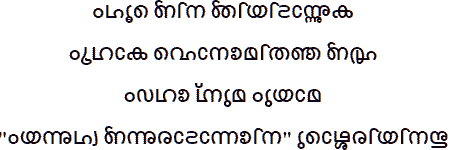Malayalam love poem
കണ്ണാടി
കണ്ണാടിയിൽ നിൻ രൂപം
എൻ അതിമനോഹര കാവ്യം
മായും മുമ്പ് വേഗം
ഇനിയില്ലൊരു "നിന്നോടാണെൻ പ്രണയം"

Conversion to Vatteluttu
கண்ணாடியில் நிந் ரூபம்
எந் அதிமநோகர காவ்யம்
மாயும் மும்ப் வேகம்
இநியில்லொரு "நிந்நோடாணெந் ப்ரணயம்"
A transliteration of my poem.
Kaṇṇāṭi
Kaṇṇāṭiyil nin rūpaṁ
En atimanēāhara kāvyaṁ
Māyuṁ mump vēgaṁ
Iniyilleāru "ninnēāṭāṇen praṇayaṁ"
Other version
കണ്ണാടിയിൽ നിൻ രൂപം
നീയാകും എൻ നല്ല കവിതേ
പക്ഷെ പൊടുന്നെനെ മായും
ഇതിന്അ ന്ത്യം "ഞാൻ നിന്നെ സ്നേഹിക്കുന്നു".

→ French poem ←
Beauty of Lakshadweep & Malayalam language
The French love poem (പ്രേമം കവിത) the mirror, translated into Malayalam the Dravidian language of southern India, official in Kerala and Pondicherry. Your light makeup is a simple pencil trace on your eyes, and your weighing jewels are bronze bracelets on your wrists. This Malayalam poem is for a beauty of the Lakshadweep islands, who is lost among 37 million Malayalam speakers.
The Malayalam language (Malayali, Malayalani, Malean, Namboodiri, Kasargod, Malabar, Central Kerala, North Kerala, Nagari-Malayalam, Mallealle, South Kerala, Moplah, Malayal, Mapilla, Nayar, Maliyad, Malayali, Mopla, Kayavar, Nasrani, Alealum, Pulaya, Autonym : മലയാളം, Malayāḷam) is the official language of Kerala.
It is closely related to Tamil, it distinguishes by 3 dialect areas, and noticeable differences for each caste. It is also a leading literary language in South India. It is the language of the state of Kerala and of the Lakshadweep islands, in southwest India. Malayalam means "the land of the mountain". The Lilatilakam, a famous 14th century work, on both grammar and Malayalam language, refers to it as" keralabha".
Malayalam Literature flourished in Kerala in convergence and in contact with the Sanskrit, Prakrit and Pali, It will borrow a lot from these languages, as well as Arabic, Persian, Urdu, Syriac, Portuguese, Dutch, Hindi and English. At the outset it is Sanskrit and Tamil that will influence the Malayalam.
The Malayalam writing system first evolved from the Vatteluttu, to the Brahmi Pan-Indian; a system that will last a long time, even adding symbols from the Grantha. The script will be reviewed in the 1970s for simplification. The dialects of Malayalam sometimes show considerable differences.
This writing is so beautiful that you get lost when you're not born with it. It is all round as her smile.
Malayalam literature
Malayalam literature is the youngest of the great Dravidian literatures. It is also one of the most varied and brilliant in India. It is also very diffused, because Kerala is very literate.
The earliest known text is Rajasekhara's Vałappali inscription, which dates back to the 9th century. The oldest work in Malayalam is Darukkavadham, a song dedicated to the goddess Kali. Literature through a Tamil tradition (Ramacaritam), a Sanskrit tradition (manipravala, bhasa, Samskrita), and an indigenous tradition that will produce folk songs and ballads. Bhasakautiliyam is the first prose written in plain language.
These three traditions date back to the 12th century. A family of Niranam poets gives Kerala his version of the Gita, his first Mahabharata, and a Ramayana of Rama Panikkar. As for Eluttaccan, he remains the greatest classical poet of the 16th century.
Traditional poetry is represented in the 18th century, by Variyar de Ramapura, in the 19th century, by Maharaja Swati Tirunal and Irayimman Tambi and early 20th by K.C. Kesava Pillai. Finally, the two Nambudiri, of the family of Venmani, lead at the contemporary epoch, the extraordinary virtuosity of Sanskrit poetry, in an erotic vein that will represent, for some, the symbol of decadence.
The great trio, Asan, Vallatol, and Vlur Paramesvaran, criticism as much as poet, infuses a greater romanticism to poetry. G. Sankara Kurup is considered to be the greatest contemporary Malayalam poet. Modern Malayalam literature is rich in fiction, poetry, prose, drama, news, biographies and literary criticism.